 |
 |
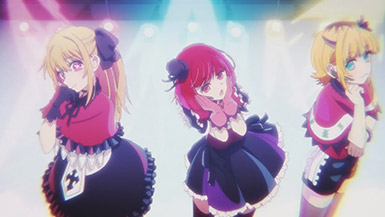 |
 |
 |
 |
 |
 |
 |
 |
 |
 |
 |
 |
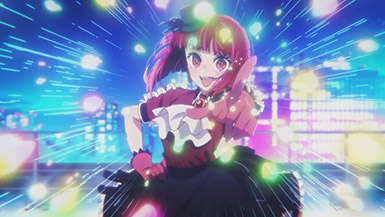 |
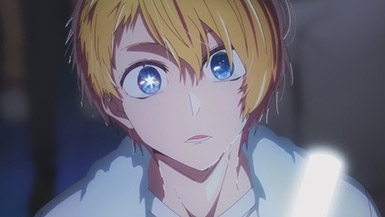 |
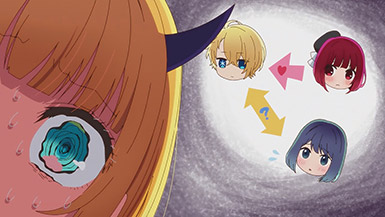 |
 |
 |
 |
 |
 |
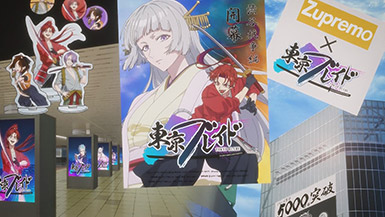 |
 |
 |
 |
 |
 |
 |
 |
 |
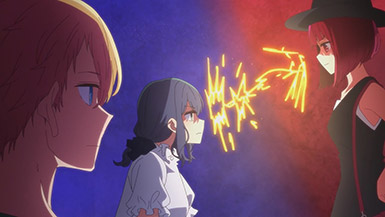 |
 |
 |
 |
 |
「アイドル」 (Aidoru)
“Idol”
Oshi no Ko wraps up its finale at the Japan Idol Festival where B Komachi works up their nerves to do justice to Ai and her old band. But as that’s all done and dusted, the anime looks ahead to the future as it sets up the next upcoming arc.
JUST LIKE A CIRCUS
One thing that struck me as odd was how only one of the older otaku remembers B Komachi when I feel like some would be more skittish about seeing if B Komachi’s comeback was going to be respectful considering the tragedy behind their break-up. Where it feels like calling your band TLC, performing as if you’re their second incarnation, and expecting T-Boz, Chili, or people who knew Left Eye to not have a problem with that.
But I digress, this is a work of fiction. Everything’s fiction. Especially the idea of Kana being given the center role when the choreography and Aqua’s dancing carried her. Ruby and MEM-Cho are treating this like it’s their big moment to live out exactly what they’ve been waiting for, and despite their canonically bad singing, their voices on the song are pretty spot on.
Meanwhile, the resentment that Kana grew up with from being abandoned by her mother and her peers is once again used to justify jealousy towards people who genuinely want to be there. Aqua snaps her out of it and makes her want to go all-out just for him, but the insecurities and trauma she grapples with are reflected in how negatively impacted she is by focusing on how others are doing compared to her.
Likewise, taking on the stage play for Tokyo Blade brings to light just how much her ego winds up being her worst enemy. I feel like there’s an unreliable narrator aspect to Kana as she initially blames her own on-set behavior for why roles started drying up for her. But as she’s granted more opportunities and gets closer to Aqua, she pins it on losing out on roles given to Akane or her handlers having little faith in her music career.
It’s even hard to trust her when she says she doesn’t object to Aqua’s relationship with Akane when she has long stretches of angst and hatred towards Aqua because he was hooking up with Akane on live television. The whole “she was my stage rival so this is solely about being rivals” excuse doesn’t cut it when she’s straight up talking about setting her sights on romancing a children’s entertainer because he’s not as cold and uncaring as Aqua.
That’s not to say Kana is lying about any of her experiences, but once she starts seeing more success as an actress and idol, she stops mentioning her ego getting in the way of her career prospects. She’s quick to lose herself in her ambitions, leaving her more prone to either being immensely jealous of anyone else in her field who’s doing well or trying to impress people out of spite. It feels like a Georgia Rule situation where the negative treatment of child stars as they grow up makes them very expendable once there are reports of volatile on-set behavior.
WHAT GOES AROUND
It’s funny how Akane winds up being a mirror version of Kana because of their similar yet different experiences in acting. She hates Kana because all of the roles she wanted were swiped up by her, but Kana hates Akane because she swiped up all of the teen roles she wanted when she came of age. In a perfect world, this would make them both mutually understand each other, and team up to tackle how female actresses are seen as replaceable once they aren’t seen as needed within certain age brackets.
But because both Akane and Kana currently define their worth based on how close they are to Aqua, their feud is made exponentially worse with the introduction of a love triangle among the two. Aqua was initially worried about whether Tokyo Blade was a BL series, but by this point, he would’ve been luckier if it was.
I think back to the one idol from the underground group who accused her bandmates of sleeping with the manager. She was used as a shining example of the type of girl that Miyako and Aqua would never want to hire because of how easily she could trash-talk her peers. Nonetheless, Akane and Kana are presented as no better than her by the time they’re trading barbs about how so-and-so got stuck in a crappy TV drama and how so-and-so needed to trade her privacy for some fame.
The show leaves off on a neat note though since it foreshadows what much of the second season will tackle. I’ve heard it’s also one of the best arcs in the manga, so if you enjoyed what Oshi no Ko has to offer, it’s quite a treat to have such a strong set-up to the next arc as we see the underlying consequences of casting two love rivals in real life as love rivals on stage.
FINAL IMPRESSIONS
If you’re a fan of Oshi no Ko and don’t wish to see it being criticized, you wouldn’t need to read much of this because my point-of-view is against popular opinion and wouldn’t help people that are interested in the show. There’s plenty to love and appreciate about the show, whether it be its gorgeous and flowy animation, bright and poppy color palette, or its unique story as an isekai dramedy that takes place within the contemporary entertainment industry.
It’s an interesting show to write about because of how it looks at the entertainment industry, but it’s hard not to feel complicit in perpetuating the same cycle of consumption that allows for even the most socially conscious stories to become a product that exploits its subjects and creators. I believe it doesn’t go beyond looking at a real societal problem it wishes to address from a high horse, yet refuses to provide a way of tackling the issue beyond shuffling back into claiming it’s all fictional so stop taking it seriously.
If the characters calling out the problems within the industry aren’t trying to change the way the industry is run and default to an “it is what it is” mindset, then the purpose of showing allusions to murdered idols and suicidal reality stars is far more crueler and exploitative than they think. For all of the blubbering that’s done about not wanting their media personalities to be preyed upon, they’re still going to put them in situations where they’ll be sacrificial lambs so that people can still have their bread and circuses.
And the show has been handsomely rewarded for resolving these situations without stepping on anyone’s toes in the industry. With enough time to reflect on the Hana Kimura situation, it’s hard not to think of what happened with the Dahmer show, and ask who would feel catharsis from seeing these tragedies acted out? Is it the victims who just wish for peace, dignity, and justice? Or is it the audience that wants to feel absolved for being complicit in the victims never receiving the closure they need?
Most idols or actresses that are targeted by crazed fans or pushed to suicide don’t get the same privilege as an anime character that can go through their same experiences and wind up with a pop-up cafe. You can lose your daughter to a toxic reality show, and then get hounded by anime fans who don’t appreciate you saying that you don’t like how they re-enacted the circumstances of your daughter’s death as an animated spectacle. That’s a problem that requires deeper societal reform than just posting a cute viral video or joining your foster mother’s talent agency.
But I guess that’s the main problem with doing social commentary in the same show where “It’s not that deep,” can be a takeaway that people get from it. If most of the solutions to the show’s problems aren’t grounded in reality because reality is far crueler and more money-focused, what WOULD be the solution?
Should everything return to the status quo? Or should everything be scrapped entirely until there is an industry that doesn’t treat its stars like meat for the meat market? The latter answer isn’t the realistic one, but it’s the only solution that doesn’t feel like it would continue the cycle of looking for new victims to exploit and bleed dry. And with the entertainment industry as Oshi no Ko’s backdrop, resigning to this fate is the only answer it can muster for rehauling the kind of society that would push idols or reality TV stars into an early grave.
I think the show’s message is also diluted by how it treats the women on the show. Most of them are written like the subjects of TV Girl or The Weeknd songs about how some broken fame-starved girl gets herself roped into trouble and pays the price. Women seem to only have a purpose on the show when it’s at the service of Aqua’s ambitions, so he’s often either charming or manipulating them into doing what he wants. Miyako and MEM-Cho are probably the only women on the show who don’t owe their success to Aqua’s existence. The other girls on the show either reinforce Aqua’s notions of how they constantly sabotage each other through petty squabbles or entirely embrace the kind of obsessive parasocial idol culture that killed Ai.
Speaking of Ai, she is done dirty by the story. Her introduction has her embracing the empty, meaningless relationship she has with being an idol, and how lying is what made being an idol so neat. Ultimately, the only time she’s told the truth was when she was dying and realized how much she loved being a mother. It almost feels like an admission of guilt from the writer that all Akane had to do to become the splitting image of Ai was to have a basic grasp of the standard idol pitfalls in the real world and see just how many cautionary tales Ai stumbled into.
If ignorantly wanting her cake and eating it too was to show us how Ai got killed by jumping into every cautionary tale you’ve read about unhinged idol fanbases, they certainly didn’t try to humanize her beyond her connection with her kids. Motherhood gave her life meaning because her ambitions and life story isn’t supposed to have any meaning for viewers.
Because she never dreamt of being an idol and saw being an entertainer as dirty work, the only thing that humanizes her is domesticity. The skin-crawling notion that falling in love made her look like more of a woman in producer Kaburagi‘s eyes is even more incriminating. Ai was never meant to be anything more than a cynical product that represents feminine beauty that can be commodified and sold. Even in her personal life, she goes from being a dream girl who’d look nice on a t-shirt to a traditional mother who puts her life’s meaning into raising children.
If the show’s intentions are to represent a woman’s experience in the industry, then what kind of takeaway are we getting from this? That if a girl works hard for their job, they grow vindictive and spiteful of each other? Or if they aren’t savvy to how the world works, they are too pure for this world and must be martyred to keep the dream alive?
It doesn’t help that our main protagonists in this story are fundamentally people who should not be in the entertainment industry. Aqua’s methodical scheming is supposed to make him seem like he’s above all of this, but he’s the 30-year-old doctor who’s using his second chance at life to mack on teenagers and subject them to his newly found Oedipus complex.
He also disrespects people’s boundaries whenever he’s hurt that they won’t talk to them, and it’s only because Kana doesn’t respect herself that she doesn’t cut ties with him for disguising himself as Pieyon because “You don’t talk to me anymore.” Save for his efforts to save Akane, his life story is practically Twitlonger fodder with how his own parasocial connection with Ai made him so obsessed with her that she became the woman of his dreams, and how she’s the only woman that he hasn’t seen was a convenient tool.
Ruby also negates a lot of the goodwill the show accumulates for being against stan culture when she becomes who she is today because of stan culture. Lucking into becoming the daughter of her favorite idol causes her to go on a full parasocial power trip when she drinks her oshi’s breast milk and remains obsessed with being in her presence always.
Rather than using her mother’s death as a learning lesson not to associate with idols because their fandoms are toxic and parasitic, she aims to repeat the same mistake her mother did by jumping right into being an idol and throwing her application around to 50 different exploitative idol agencies. It works out, yes, but it’s also a copout to avoid confronting the societal problem that stems from the idol fandom creating weirdo trash like the guy who killed Ai.
As tempting as it is to see the second season, I wouldn’t be writing on it because I imagine it was torture enough having to deal with me being negative about something a large amount of people enjoyed. And I wouldn’t criticize or hate people for liking the show because there is a lot to enjoy about it. There were just some bridges I personally had a difficult time crossing with the show.
I think I wound up overthinking most of the show’s elements, and couldn’t tune out any of the skepticism I have towards how it views the entertainment industry. I couldn’t shut my mind off when watching this, and it wound up leaving me with a bitter perspective on a majority of the characters in the show. It’d be in many fans’ best interests if I stepped away from the series and didn’t hover over it like an unpleasant specter.
Epilogue:
 |
 |
 |
 |
 |
 |
 |
 |
 |

First of all, you cannot expect to please everyone, then as it is now, especially with a saga which has won a massive following either for its story or its biting social commentary on showbiz in general.
That, per se, the only concrete changes to entertainment and to prevent a return to the traditional status quo — and hence, positive systematic and cultural changes — is when government policymakers get bothered enough by what amounts to human rights violations and must intervene with new laws demanding more freedoms and rights to creatives… but given the current state of the world, only a few countries have very strong protections and rights guaranteed to creatives and artists, including the right to form unions and combat harassment and bigotry, something that could not be easily applied to other countries like Japan and South Korea, which have radically different entertainment systems, systems that are heavily rigid, reliant on hierarchies along with the overriding belief of the East Asian showbiz moguls that theirs should never be changed or bent to the wishes of the world and the consumers of entertainment, fearing that any change would destabilize the power structure and, yes, the flow of money.
I surmise that, if the show were to be scripted by a woman understanding of young women’s issues, both in entertainment and outside of it, the adaptation would have been markedly different and more understanding of the thorny issues the manga tried to address. But then the majority of the people who worked on the show, and many of themselves fan of the original work, insisted on a nearly-faithful reproduction, which we really have to put up with, however it rankled a lot of nerves.
Nonetheless, Oshi no Ko the show — and the manga — is but the kind of tasteful meal that I sought for, after more than a decade of being absent from anime, unable to find compelling anime to watch other than media from the 1990s. That I have experienced it, and finding myself wanting more.
I at first found it odd the cour was only 11 episodes. Then I remembered the pilot had the budget of THREE episodes.
I am happy that Kana has had her confidence restored; for a brief while, I was worried that she wouldn’t make it. Kana didn’t seem as receptive as Akane when Aqua tried to help or offer recognition.
Also, where is Miyako’s husband right now? … Oh no, don’t tell me those crazy SIMPS killed him too, and Miyako has yet to find out.
I very much agree with your final impression (other than not wanting to watch a 2nd season).
The fact that nobody seems to learn from the past and everything seems to repeat itself, and by extension, Ruby and Aqua being reincarnated and repeating a futile struggle makes no sense other than to push the story.
Akane and Kana are an interesting comparison because you are right, they should understand each other, and very likely do, but cannot let go of the fact that they each got in the way of each others way and it really doesn’t help they are still children.
TBH having skepticism about the show/work probably helped more than hindered the weekly write up.
End the end, i think much of my enjoyment of the series definitely came from being able to turn my brain off and enjoy the VA’s and animation quality (because the show had spades of both), even if it doesn’t ask enough questions or steps on enough toes. Then again would a series that stepped on too many toes and asked to many or too hard questions get made in the first place?
I think your final impression described really well why I don’t feel as strongly as everyone else does about the show.
It’s an odd series. I came into this expecting a series about how screwed up the entertainment industry in Japan is, criticizing it, and how the main characters would make an effort to change it for the better. Or even if they couldn’t, they would at least try to not go into the same pitfall. The show ended up going in a direction that wasn’t what I hoped for.
I also don’t feel any strong feelings for any of the characters either, and the romance subplot, be it Kana and Aqua or Akane and Aqua still feels somewhat forced.
In the end, all I can say about this series is that it’s just okay for me. I can’t say I like it, but I can’t say I hate it either. I would still recommend this to people because I think they’ll enjoy it, though. I hear the upcoming arc in S2 is going to be great, so hopefully the series will be able to hook me again because I do want to like this series.